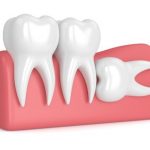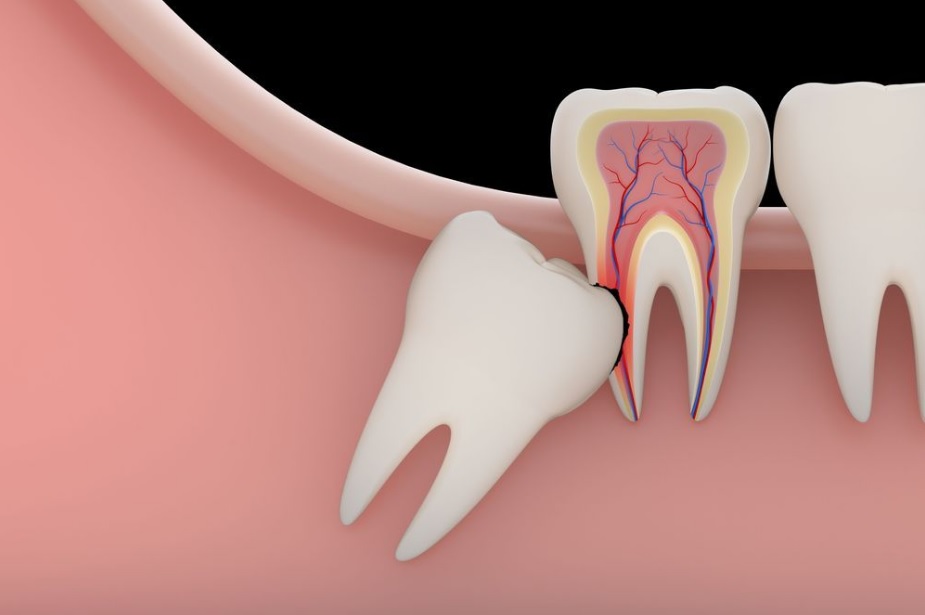Wisdom Teeth – Do You Need to Have Yours Removed?
 Wisdom teeth, also known as third molars, are usually the last teeth that erupt through the gums, most often happening between one’s late teen years and early adulthood. Although most people have four wisdom teeth, some people don’t develop any at all.
Wisdom teeth, also known as third molars, are usually the last teeth that erupt through the gums, most often happening between one’s late teen years and early adulthood. Although most people have four wisdom teeth, some people don’t develop any at all.
When erupting in a healthy manner and in the correct position, these third molars can remain in the mouth for one’s entire lifetime (if well taken care of), but unfortunately this is often not the case.
With it erupting at that age, it is expected that the jaws have already fully developed and chances are, there is not enough space for a proper path of eruption for the 3rd molars. Because of this, chances are that you will need Wisdom Tooth Extraction.
For healthy eruption of third molars, there must be adequate space to allow the teeth to fully develop, however if there is insufficient space along the jaw, they can become trapped or ‘impacted’ either fully or partially. In these cases, one’s wisdom teeth can begin growing at different angles, sometimes even horizontally, resulting in other dental complications that be easily prevented by removal of the impacted wisdom teeth.
Through the aid of X-ray, your dentist Hornsby will assess the position of the wisdom tooth Sydney and check for the angulation in the jaw. From this, a treatment plan will be made for wisdom tooth extraction and this is recommended to prevent future problems related to it.
-
Partially impacted wisdom teeth can mean that part of the tooth still erupts but part of the tooth is covered by an operculum (flap of gum tissue). If food and bacteria become trapped in this area, this tissue can become inflamed, known as ‘pericoronitis’, resulting in swelling, pain, discomfort, fever, bad taste in mouth, discharge of pus, difficulty swallowing and opening mouth, as well as enlarged lymph nodes.
-
Impacted wisdom teeth can also damage second molars that are in close proximity through pressure forces being exerted at the site of contact. The forces on the adjacent teeth can result in the eventual loss of tooth structure as well as crowding of the nearby teeth.
-
Since wisdom teeth are positioned further back in the mouth, they can quite easily be missed during regular twice daily brushing and daily flossing. This makes them more susceptible to tooth decay and gum disease than other teeth, especially when the teeth are partially erupted.
-
A fluid filled sac, called a dentigerous cyst, can develop around the tooth, resulting in destruction of underlying bone, gum tissue and possibly other teeth.
The eruption of wisdom teeth is closely monitored during regular check-up and teeth cleaning visits, so a dentist may be able to flag potential complications long before symptoms appear. Pain is often a good indication of underlying problems and if so, a dental appointment is required to assess all symptoms and treat the condition.
A dental practitioner may also take an x-ray to identify and discuss whether wisdom teeth removal are indicated.
Depending on the patient and positioning of the wisdom teeth, a dentist may perform the wisdom teeth removal Sydney in the dental chair or alternatively provide a referral letter to visit an Oral and Maxillofacial Surgeon (OMFS) for management of more complicated surgical extractions.
Wisdom teeth removal cost is also very case dependent but consulting with your dentist will give you a close estimation.
If you are concerned about your wisdom teeth or are experiencing any pain or discomfort, contact us at Hornsby Dental to schedule a consultation with one of our dental practitioners.
The Wisdom Tooth is associated with many dental problems. Some of which include:
- Severe pain that radiates from the jaw joints up to the temples causing headaches
- Strain on the jaw joints and muscles
- Difficulty in eating and speaking
- Malalignment of the teeth (Crowding)
- Inflammation of the gums covering the impacted wisdom tooth (Operculitis)
- Decay on the adjacent tooth due to the wisdom tooth pressing against it
- Infection leading to cysts and bone damage
Fortunately, the Wisdom Tooth has no viable function in the mouth. For as long as you have your other molars, you should be able to chew and eat well. So for that reason, consider having your consultation with your dentist near me for a Wisdom Teeth Removal Sydney.
1. Initial Consultation and Assessment
For your initial visit for wisdom teeth removal Hornsby, your dentist will do a comprehensive dental work-up and assessment for the positioning of the wisdom tooth in your mouth. This is aided by an X-ray.
Some cases are considered to be simple extractions especially if most of the body of the tooth has emerged in the mouth whilst some will be needing surgical interventions for removal.
2. Treatment Proper
The surgical proper is divided into three: administration of anaesthesia, removal of the wisdom tooth, and closing of the gum through sutures. To guarantee a painless procedure, your dentist will first numb the involved area before proceeding with removal. Some pressure will be felt but our dental team will ensure that you are never in any discomfort.
When the anaesthesia has taken effect, removal of the tooth is facilitated by loosening the tooth from its socket and then pulling it out using forceps. This is done with minimal unnecessary force to prevent fracturing the tooth making retrieval more difficult. If your case is deemed to be surgical, some amount of gum and bone removal may be required.
Lastly, suturing is done to close the wound. This prevents food debris and bacteria from lodging in the open socket which may cause infection.
3. Post-treatment Education
Immediately after surgery, your dentist will ask you to bite down on a gauze to induce pressure and minimise bleeding. The wound will heal faster if the blood clot on it is kept intact. This clot is full of nutrients that factors in with better recovery.
Also, a guideline of your do’s and don’t after treatment will be discussed after the procedure. This includes strict dietary and workload restrictions.
4. Recovery
Your wisdom teeth removal recovery is expected to be at around 1 to 2 weeks but this still depends on your discipline in following your dentist’s advice. Keep in mind that you work hand in hand with your dentist Hornsby for the success of your treatment.
At Hornsby Dental, we offer proper assessment of your case through comprehensive oral check-up and the use of diagnostic tools such as OPG or panoramic X-ray. This enables our dentist Hornsby to analyse the emergence of your wisdom tooth and if it will pose complications.
If removal is warranted, the X-ray will help with evaluating the position of the wisdom tooth in the mouth and allow them to map out the treatment plan during surgery.
You are in the best hands with our team of dental experts. From your initial consultation, treatment proper, and post-treatment education, you are guaranteed a safe experience for your Wisdom Teeth Extraction.

